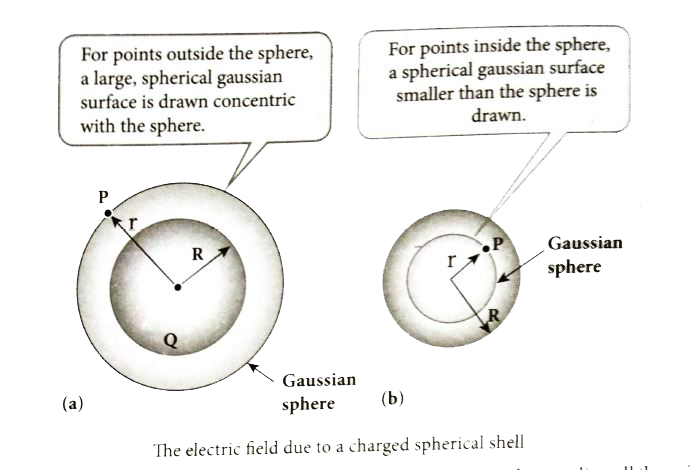Obtain the expression for electric field due to an uniformly charge spherical shell. Solution in Tamil
Electric field due to a uniformly charged spherical shell: Consider a uniformly charged spherical shell of radius R and total charge Q. The electric field at points outside and inside the sphere is found using Gauss law.
Case (a) At a point outside the shell (r> R): Let us choose a point P outside the shell at a distance r from the center as shown in figure (a). The charge is uniformly distributed on the surface of the sphere (spherical symmetry). Hence the electric field must point radially outward if Q> 0 and point radially inward if Q < 0. So we choose a spherical Gaussian surface of radius r and the total charge enclosed by this Gaussian surface is Q. Applying Gauss law,
∮→E.d→A=Qε0 ...(1)

The electric field →E and d→A point in the same direction (outward normal) at all the points on the Gaussian surface. The magnitude of →E is also the same at all points due to the spherical symmetry of the charge distribution
Hence E∮dAGaussian surface=Qε0...(2)
But ∮dAGaussian surface =total area of Gaussian surface =4πr2.
Substituting this value in equation (2).
E.4πr2=Qε0
E.4πr2=Qε0 (or) E=14πε0Qr2
In vector form →E=14πε0Qr2ˆr ...(3)
The electric field is radially outward if Q>0 and radially inward if Q<0. From equation (3) we infer that the electric field at a point outside the shell will be same as if the entire charge Q is concentrated at the center of the spherical shell. (A similar result is observed in gravitation, for gravitational force due to a spherical shell with mass M)
Case (b): At a point on the surface of the spherical shell (r= R): The electrical field a points on the spherical shell (r=R) is given by
→E=Q4πε0R2ˆr ...(4)
Case (c) At a point inside the spherical shell (r< R): Consider a point P inside the shell at a distance r from the center. A Gaussian sphere of radius r is constructed as shown in the figure (b). Applying Gauss law
∮→E.d→AGaussian surface=Qε0
E.4πr2=Qε0 ...(5)
Since Gaussian surface encloses no charge , So Q=0 . The equation (5) becomes
E=0 (r < R) ...(6)
The electric field due to the uniformly charged spherical shell is zero at all points inside the shell.
Topper's Solved these Questions
- BOOK - FULL MARKSCHAPTER - SAMPLE PAPER-1 (SOLVED)EXERCISE - Questions28videos
SAMPLE PAPER-1 (SOLVED)
- BOOK - FULL MARKSCHAPTER - SAMPLE PAPER-07 (SOLVED )EXERCISE - (PART - IV)(Answer all the questions.)10videos
SAMPLE PAPER-07 (SOLVED )
- BOOK - FULL MARKSCHAPTER - SAMPLE PAPER-16 (UNSOLVED)EXERCISE - PART-IV10videos
SAMPLE PAPER-16 (UNSOLVED)
Similar Questions
What is meant by Fraunhofer lines?
07:23View SolutionCalculate the electric field due to a dipole on its equatorial plane. (OR) Electric field due to an electric dipole at a point on the equatorial plane
04:34View SolutionDerive an expression for electrostatic potential energy of the dipole in a uniform electric field .
07:23View SolutionObtain the expression for electric field due to an uniformly charge spherical shell.
07:23View SolutionDerive an expression for electric intensity E due to a uniformly charged thin spherical shell at a point outside the shell.
04:13View SolutionObtain the expression for electric field due to an uniformly charge spherical shell.
05:12View SolutionObtain the expression for electric field due to an uniformly charge spherical shell.
10:17View SolutionFind expression for electric field intensity due to a uniformly charged thin spherical shell at a point outside the shell.
09:06View SolutionObtain the expression of electric field by thir spherical shell with uniform charge distribution at a point outside it.
06:26View SolutionState Gauss's theorem with the help of diagram, derive an expression for the electric field intensity due to uniformly charged thin spherical shell at a point on the surface of the spherical shell.
02:13View SolutionObtain an expression for electric field intensity due to uniformly charged spherical shell or hollow sphere.
08:05View SolutionDerive an expression for electric field due to a uniformly charged spherical shell. i) at a point outside the shell
06:13View SolutionDeduce the expression of field at P due to a uniformly charged thin spherical shell when the point,P is inside the shell.
01:42View SolutionDerive the expression for electric field intensity due to a uniformly charged thin spherical shell at a point outside the shell
01:13View SolutionDerive the expression for electric field intensity due to a uniformly charged thin spherical shell
at a point inside the shell.02:32View Solution
